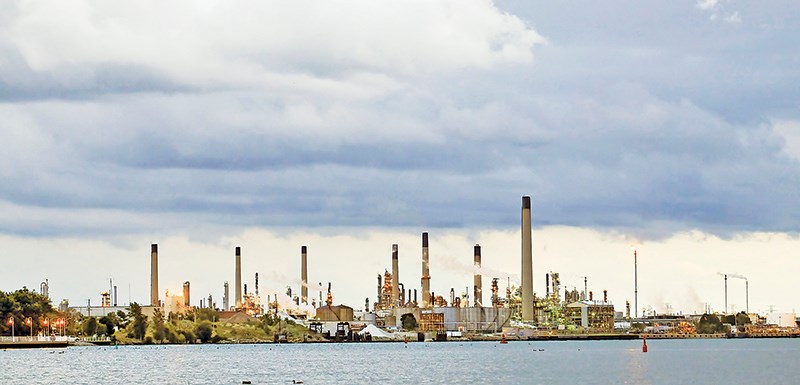The federal government says it’s imposing strict benzene pollution controls in Sarnia’s petrochemical industry, “in the pursuit of environmental justice for Aamjiwnaang First Nation.”
The announcement came Friday, with Minister of Environment and Climate Change Steven Guilbeault issuing an interim order that will require Sarnia’s petrochemical facilities to implement vapour-control measures, ‘including fully closed vent systems with vapour control on certain storage tanks that store benzene.’
The order applies to facilities with fenceline concentrations of benzene above 29 micrograms per cubic metre (μg/m3) measured in any of the two-week sampling periods beginning on March 1, 2023, and ending on February 29, 2024.
The news comes in the wake of ongoing reports of elevated benzene levels that have shut down buildings and parks at Aamjiwnaang First Nation, where residents, chief and council say a nearby chemical manufacturing facility, INEOS Styrolutions, is to blame. The First Nation declared a state of emergency last month, and the province has since suspended its Environmental Compliance Approval for INEOS — where operations have been temporarily shut down for nearly a month — until a number of requirements are met.
“It is simply unacceptable that the people of Aamjiwnaang First Nation and Sarnia face ongoing issues with poor air quality,” Guilbeault said in a news release Friday. "Indigenous peoples have a right to a healthy environment and too often are impacted by polluting industries.
“I truly appreciate the Government of Ontario’s actions to address this situation to date,” he added. “Now, based on the air quality data and lack of action by industry to address their pollution, I am using the powers provided by the Canadian Environmental Protection Act to advance environmental justice in this community.”
The order will be in effect for 14 days, pending Governor in Council approval, which would extend the order for up to two years.
Benzene, a known human carcinogen, is a product or a by-product that is part of the operations at several local facilities.
“Aamjiwnaang acknowledges and supports the announcement of the Interim Order issued by the federal government. Our Environment Committee, Environment Department, Council and Chief, and the citizens of Aamjiwnaang, for whom we have been advocating, are appreciative of the collaboration between the federal government and Aamjiwnaang to uphold our treaty and inherent rights,” Aamjiwnaang chief Chris Plain and council said in a statement. “Aamjiwnaang is confident that this Order will not only add to the protection of the air quality in Aamjiwnaang, but also relieve the burden placed upon the air shed in the Sarnia–Lambton area.”
Government officials pointed to a “what we heard” public consultation update on the proposed Reduction in the Release of Volatile Organic Compounds (Storage and Loading of Volatile Petroleum Liquids) Regulations that informed the interim order.
“The government thoroughly consulted with Aamjiwnaang First Nation, other Indigenous peoples, industry, provinces and territories, and other stakeholders in drafting these regulations,” officials stated, adding they are designed to further reduce emissions of volatile organic compounds, including benzene, from the petroleum and petrochemical industry in Canada.
Once finalized, the regulations would apply to terminals, refineries, upgraders, petrochemical facilities, and bulk fuel facilities that store volatile petroleum liquids in tanks that meet or exceed a specified capacity; or load and unload volatile petroleum liquids that exceed a specified daily or annual quantity.
“The regulations would set a timeline to install abatement equipment and would also further reduce air pollution from hundreds of sources across Canada.”
INEOS did not immediately respond to a request for comment, Friday. The company has maintained it did not breach its emissions limit for benzene, and calls the province’s compliance timelines ‘unrealistic.’
Company officials have also raised concerns about the impact on local industry, the economy and environment.
“We are currently grappling with uncertainty regarding the regulatory authority governing our operations, whether it is the Ministry or our neighbours, the Aamjiwnaang First Nation,” INEOS president of operations Pierre Minguet wrote in a letter to Ontario’s Environment Minister Andrea Khanjin May 8. “The directive we have received suggests that the Aamjiwnaang First Nation holds ultimate authority over the fate of our site, irrespective of the Ministry’s directives.
“We require certainty on the future regulatory framework to determine if we are able to justify further investment into our Sarnia site and resume operations.”
